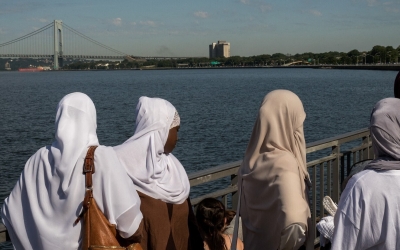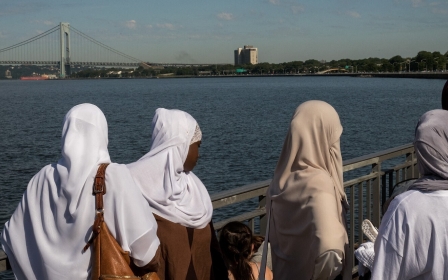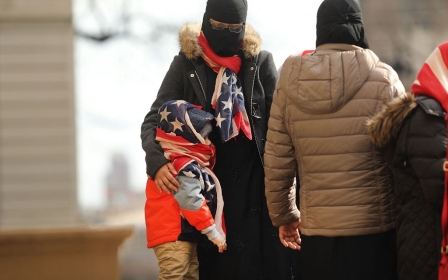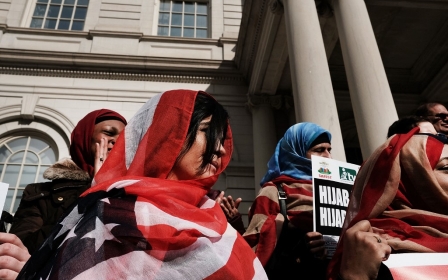Why popular Muslim figures facing serious allegations escape accountability

When Yasmin was younger, her Quran teacher inappropriately touched her. Every time she made a mistake in her recitation, he would slap her on one of the most sensitive spots of her body.
She kept quiet and eventually grew up and no longer needed to be taught by a Quran teacher. But her experiences from that class never left her. It didn't help that she stayed in that same community. It didn't help that her Quran teacher became an imam of the local mosque in Chicago. And it didn't help that she felt that she could tell nobody.
Six years ago, in New York, where she now lives with her husband and three children, her mom called her. It was a routine call until her mom said something that caught her off guard.
"The imam has sexually harassed young girls," Yasmin recalled her mom telling her.
"She brought it up so randomly, I was like, 'Wait, what?'" Yasmin told Middle East Eye.
New MEE newsletter: Jerusalem Dispatch
Sign up to get the latest insights and analysis on Israel-Palestine, alongside Turkey Unpacked and other MEE newsletters
Yasmin asked her the name of the imam and then held her breath. When her mom answered, it all came flooding back.
"It was the same man. Apparently, a few women spoke out in the community about what he had done to them when they were young," Yasmin said. The women are around 35 now, which makes them Yasmin's age.
Yasmin didn't know those women, but she knew they were telling the truth. Because the man who was supposed to watch over them did the same to her.
The imam denied everything. Much of the community believed the man, but there was a fair number of them that believed the women. And eventually, they told him to leave.
The imam went to Yemen for a year. But when he came back, he resumed his position as imam again. No questions asked.
"No one ever questions it," Yasmin said. "It's literally the story of all these religious men who abuse young women. They disappear for a while and then come back like everything is the same. The problem is that we as a society allow that to happen."
An accountability void
In 2021, Facing Abuse in Community Environments (Face), an organisation that investigates Muslim community leaders, published a report about Fatih Seferagic, a social media influencer who has described himself as a Quran teacher and reciter.
In 202o, accusations against Seferagic started to surface. In 2021, a Face investigation collected testimonies accusing Seferagic of rape, drug-affiliated sexual assault, and the reckless transmission of a sexually transmitted disease, among other accusations. Multiple women came forward with their experiences to Face.
He responded by calling them "false allegations" and said he had never been approached "by any law enforcement agency regarding these allegations".
"They have been fabricated and propagated by an organisation that has an agenda and no legal authority," he said.
He dismissed the organisation, Face, and many came to his defence.
Two large Muslim organisations, Human Appeal (UK) and Muslim Aid (US) terminated their affiliations with Seferagic.
But in March 2023, Seferagic led Tarawih - night prayers performed specifically during the Muslim holy month of Ramadan - at Times Square, attended by hundreds of people. Once the video of him leading the prayer was posted on social media, many people were outraged.
Muslims began sharing and reposting the Face report. It was later found that Seferagic was invited to lead Tarawih for a week at a mosque in Canada. There was an unsuccessful effort on social media to get that cancelled.
MEE reached out to Seferagic for comment but did not receive a response by the time of publication.
'One way to hold them accountable is to say no, we're not going to let them come into our mosque any more'
- Shehnaz Haqqani, professor
Alia Salem is the founder and executive director of Face. She said every day she grapples with trying to answer why men accused of sexual harassment or assault are reintegrated back into society and prominent positions without facing accountability.
"We don't have judicatory powers. We don’t have mechanisms that are authoritative to the point where we can directly implement change as a result of our investigative findings. At Face we can publish information and warn people but what they do with those warnings is up to them," she told MEE.
To date, Face has reports of seven investigations up on its website. Men have been accused of rape, child sexual abuse, marriage fraud, misappropriation of zakat (charity) funds, secret marriage, and counselling malpractice.
Salem explained that oftentimes people in the community would make excuses for why they never received a "warning". Sometimes, they'd have a valid excuse, especially if it's a small mosque in a cloistered, insular community that doesn’t have a connection to the online environment.
Sometimes, people in the community hear about the allegations but blame survivors. Why didn't they come out sooner? Where's their proof? Why didn't they file a police report? It is disheartening, but not surprising, Salem said.
In the Muslim community, there are no national organisations that have a formal body or process where people can submit an allegation against a Muslim leader and it would be investigated. Many large umbrella organisations have put forward no visible effort to hold accountable those that are within their purview, Salem said.
"We sometimes see a few well-meaning people who come forward and speak about these situations once in a while but there's a complete void of entities, with the supposedly necessary qualifications, doing anything of real substance about leader accountability," she said.
"Then along comes this little scrappy organisation Face, with little to no resources, trying to do something meaningful but instead getting attacked for daring to help fill the void," she said.
"They use the same tired adage that we are raging feminists trying to tear down our community. As if women's empowerment is a bad thing."
Silencing victims
Zahra Ayubi is an associate professor of religion at Dartmouth College and a scholar of women and gender in premodern and modern Islamic ethics.
She argues that whenever these types of issues take place in the Muslim community, there is never a reckoning. When accusations emerge, there's the "silencing and often maligning of the person bringing forth the accusations. There's the initial place of maligning them and calling them liars," she said.
She brought up the example of Nouman Ali Khan, an Islamic speaker who founded the Bayyinah Institute for Arabic and Quranic Studies. He was accused of using his position to lure and groom women into sexual relationships under the guise of secret marriages, all while legally being married to someone else. The allegations sparked outrage, with people coming in defence of the women and of Khan.
Khan denied the allegations and largely disappeared from public life for a while. He has since resumed his lecture series on his YouTube channel which has 1.71 million subscribers and his videos are commonly shared on social media.
MEE reached out to Khan for comment, but he declined to comment.
"There is a lot of effort to separate their actions from their other works, which are categorised as pure and wholly good for the greater Muslim community," Ayubi said, referring to lectures and papers.
Shehnaz Haqqani is an assistant professor of religion at Mercer University focusing on gender and sexuality. She explained that in Islamic studies academia, there's currently a conversation taking place about how exactly to hold men accountable, as there isn't a set of rules already in place.
'You can fire them. You can relieve them of their responsibilities'
- Alia Salem, Face
Holding men accountable depends on different factors and on the specific roles the individuals play, she said. Therefore, accountability will not always look the same.
"If they are scholars or preachers of Islam, one way to hold them accountable is to say no, we're not going to let them come into our mosque any more," she said. "We're going to deprive them of their title, of their position, of their role in our community. We're not going to share their lectures. We're not going to fund them in any way."
If the men are in academia, then the best way is to not cite them, Haqqani believes. "You can always find a safer alternative for someone who has not committed crimes."
If these people are constantly being booked and invited and praised, then nothing will change, experts told MEE.
"People move to a new place without any consequences," she said. "Once they become notorious and scandalised in one place, they move and start over in another place. There's no rehabilitation."
Restorative justice
For Ayubi, justice is different for everyone. For some, it might be reducing harm to others. For some, it might be the protection of their own sanctity; it might be speaking the truth about what happened to them as a means of requesting that the community recognise their experience and offer support. And for others, it might be filing a police report.
Many survivors of sexual harassment and assault don't file a police report. In the US, only 310 out of every 1,000 sexual assaults are reported to police. That means more than two out of three assaults go unreported, the Rape, Abuse & Incest National Network cited.
While many women, in this case, Muslim women, don't go to the police, accountability and justice come from within the community.
Salem doesn't have faith in the criminal justice system. She believes punitive measures are just punishment. She argues that accountability is when someone is given an opportunity to own what they have done and when they engage in a process that allows for the survivors and perpetrators to heal.
The process she is referring to is more in line with restorative justice, a practice that attempts to humanise people. It seeks to "examine the harmful impact of a crime and then determine what can be done to repair that harm while holding the person who caused it accountable for his or her actions".
"Justice to me does not look like jail for people who abuse," she said. "Justice to me looks like proactive communities, communities who believe victims, who prioritise victims and vulnerable people over the protection of individuals and institutions."
When people who have harmed others take accountability for themselves and engage in a process that centres on those who have been harmed, that is what justice is, she said. It is when they seek to right their wrongs and seek out restoration and wholeness.
"Humans are capable of doing extremely evil things but they are also capable of so much goodness if they are willing to submit themselves in opposition to their ego for the sake of justice."
But it begs the questions: what should happen to men who face such allegations? Should communities shun them forever? When are they allowed to come back? These are questions academics and scholars have long been grappling with.
'When I was abused, I got to decide when I will forgive this individual, if at all'
- Shehnaz Haqqani, professor
Salem believes that if there are substantial allegations against a person, then that person should be removed from their position until they are found to be innocent or if it was a false allegation.
"People are always like 'due process, due process, we can't fire them’' No. You can fire them. You can relieve them of their responsibilities,” she said.
"This person came forward, they have every right to make an allegation, and this is severe enough that we need to remove you from your position until we find out more. These are the types of things we're not doing as a community."
Justice isn't the same for everyone. Determining how long a person should stay away from their position isn’t a one size fits all situation, Haqqani said. It depends on the crime. It depends on if there was punishment. And at the end of the day, it is up to the community to make the decisions.
"I don't think every one of them should be put away forever. It depends on the crime. It depends on how many people they abused," Haqqani said. "If it's an international figure, then it needs to be an international conversation. If it's more local, then we need to decide what mosque boards and leaders need to step in."
But having these men stay away from their positions is not cancel culture, a critique many on social media put out every time Face comes out with an investigative report on a man.
The work Face does is rooted in an objective process that was crafted by multiple disciplines. Once someone comes forward with their story, the organisation will work to substantiate it. Sometimes the reports are made public. Sometimes they are never released because they are unsubstantiated or because of extenuating circumstances.
"Our process by definition negates the possibility that Face's approach feeds into some kind of random slapstick cancel culture," Salem said.
Who gets to forgive
The idea of repentance, asking for forgiveness, is emphasised in Islam. Repentance is a spiritual act solely between a person and God. Oftentimes when a man has been accused of such acts, people will come to his defence and say that it is ok for him to move on because he repented to Allah.
They will argue that the community should forgive him, as he has asked Allah for forgiveness. But by saying this is dismissing the people the man has harmed, experts tell MEE.
"Forgiving someone who has harmed you is a spiritual practice that has to do with the state of your soul and nothing to do with justice in this world. I can forgive somebody who has harmed me, but that doesn't mean I don’t seek justice in this life," Salem said.
'I know we will get our true justice in the afterlife'
- Yasmin, survivor
She recalled a story of a woman who came to Face with an allegation. She was married to the individual she accused. She forgave him. She has relatively healthy communication with him at times, but she is still seeking justice. She is working to do what her responsibility is to do to hold this person accountable, Salem said.
While Islam doesn’t require anyone to forgive anyone, they are still encouraged to do so. To determine whether a person is forgiven by the community, it should be up to those who were most impacted - the survivors.
Haqqani was abused by her Quran teacher. Knowing that it was entirely up to her whether or not she would forgive him felt very liberating.
"When I was abused, I got to decide when I will forgive this individual, if at all. No one else gets to make that decision for me, and with me," she said. "I don't even have to consult anyone else for that. Anyone else who was abused by him can decide. Some say maybe he's repented. I don't know that he's repented. And I don't care that he's repented."
Yasmin forgave her abuser. He never asked for forgiveness, and he never admitted to any wrongdoing, but deep in her heart she forgave him. And every day, she prays.
"I pray for the other women who he had hurt. I pray they find peace," she said. "Sometimes, I wonder if he'll ever face accountability, but I know we will get our true justice in the afterlife."
Middle East Eye delivers independent and unrivalled coverage and analysis of the Middle East, North Africa and beyond. To learn more about republishing this content and the associated fees, please fill out this form. More about MEE can be found here.





